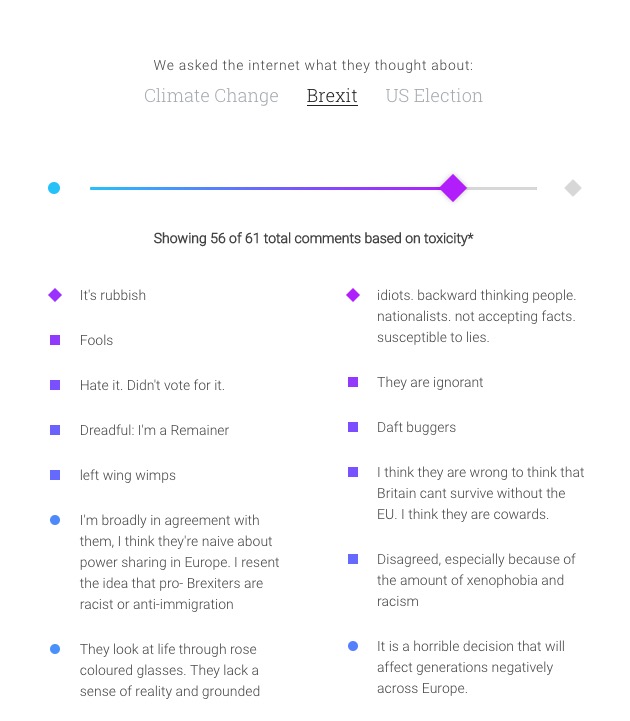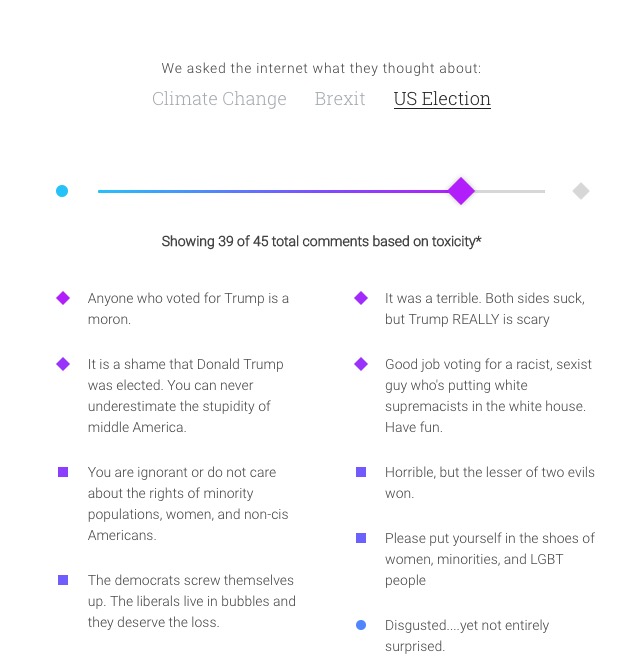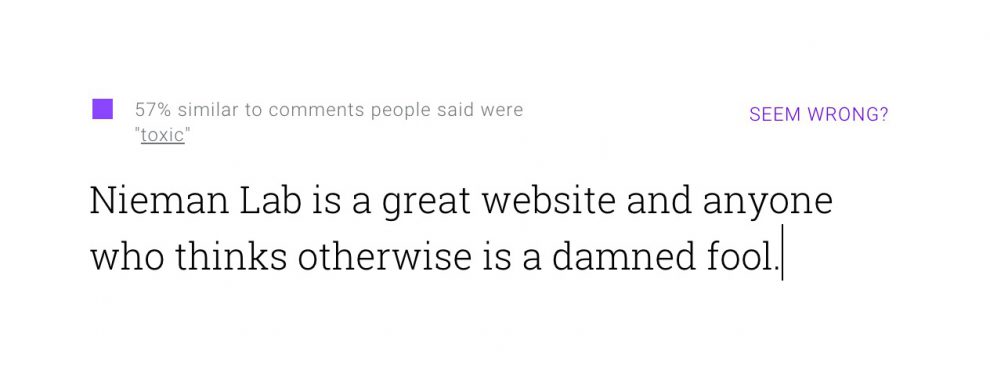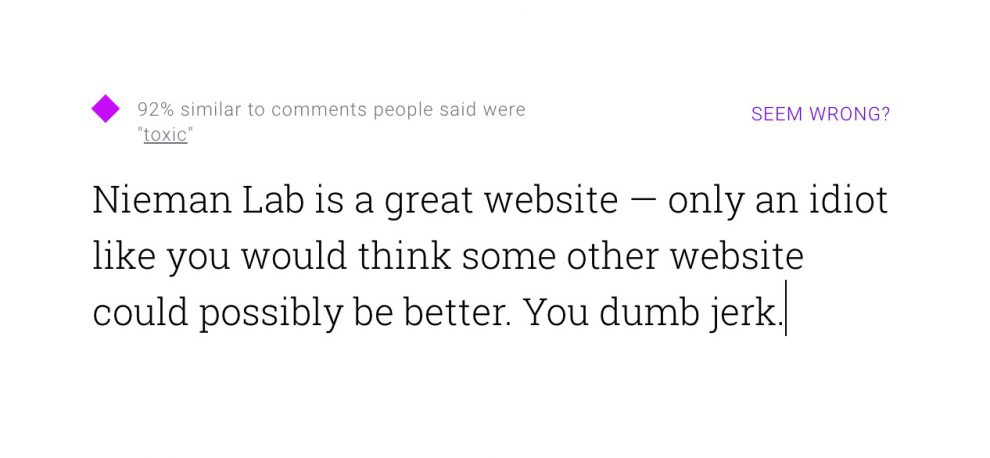Jigsaw, the technology incubator within Google’s parent company Alphabet, released a new tool Thursday that uses aims to improve publishers’ comment sections by using machine learning to identify “toxic” comments — defined as “a rude, disrespectful, or unreasonable comment that is likely to make you leave a discussion.”
The tool is called Perspective, and Jigsaw is testing it with The New York Times, The Guardian, The Economist, and Wikipedia. Other outlets can request access to Perspective’s API.
In a Medium post, Jigsaw president Jared Cohen explained how Perspective works:
Perspective reviews comments and scores them based on how similar they are to comments people said were “toxic” or likely to make someone leave a conversation. To learn how to spot potentially toxic language, Perspective examined hundreds of thousands of comments that had been labeled by human reviewers. Each time Perspective finds new examples of potentially toxic comments, or is provided with corrections from users, it can get better at scoring future comments.
Publishers can choose what they want to do with the information they get from Perspective. For example, a publisher could flag comments for its own moderators to review and decide whether to include them in a conversation. Or a publisher could provide tools to help their community understand the impact of what they are writing — by, for example, letting the commenter see the potential toxicity of their comment as they write it. Publishers could even just allow readers to sort comments by toxicity themselves, making it easier to find great discussions hidden under toxic ones.
(Whatever anxiety journalists might have about someday being replaced by algorithms, one suspects that reading hundreds of thousands of toxic comments is a job most wouldn’t mind handing off to the robots.)
Users can play around with the tool on Perspective’s website. A slider lets you see different levels of toxicity on specific topics. For example, here are comments Perspective considers high in toxicity on climate change:
They have their heads up their ass.
They are liberal idiots who are uneducated.
Climate change is happening and it’s not changing in our favor. If you think differently you’re an idiot.
They’re allowed to do that. But if they act like assholes about, I will block them. How can you be so stupid?
They’re stupid, it’s getting warmer, we should enjoy it while it lasts.
I think those people are stupid and short-sighted
It rates these are middling in toxicity:
uneducated bumpkins or willfully ignorant with vested interests
My thoughts are that people should stop being stupid and ignorant. Climate change is scientifically proven. It isn’t a debate.
You either trust in God or think you are smarter than him.
Over-hyped nonsense.
I think its a farce and stinks like a bathroom after 26 beers
Fools
They are uninformed or ignorant
Their opinion, just don’t force it down my throat
And these it rates low in toxicity:
I think the earth goes through cycles and we’re in a warmer cycle
I respect them but I believe they think I am stupid and only thinking short-term. I believe we don’t know what will happen long-term regardless of supporting regulation regarding climate change. Regulation impedes industry and job creation.
I think it exists. But, I am not big on regulations regarding climate change. The EPA regulates way too much.
Clearly man made, but unsure of its extent and whether anything substantial can be done about it
Haven’t seen unbiased data
It’s a natural phenomenon.
Climate changes naturally.
I believe that we are contributing to an already existing ‘condition’ that occurs, naturally, over the millennium.
I think that there is not much that we can do and that we play a very small role in the overall changing of our planets climate
Climate change is occurring but humans have little impact if any for its cause.
(Toxicity is clearly not the only scale on which one could measure the quality of a comment — Perspective makes no claims to be measuring accuracy.)


You can also type in your own comments to see how they are graded on Perspective’s scale — scaling your inner jerk up and down to see the impact:



The Economist, meanwhile, will try the tool on some of its blogs, community editor Denise Law told Fortune. Law said that “really good” comments are often overwhelmed by some of the less productive contributions.
“The Economist has long been a place for debate, but the comments are not at the level we’ve hoped them to be,” Law said.
Perspective is just the latest in a (very) long line of attempts to improve comments. The Times, The Washington Post, the Mozilla Foundation, and the Knight Foundation have supported the Coral Project, which develops open-source tools to improve community. Similarly, a Portland-based startup called Civil created its own commenting platform that requires users to grade the civility of comments.Jigsaw said it will be rolling out access to Perspective to other publishers over the course of 2017, and Cohen said the team will improve the tool’s machine learning capabilities over time. Perspective may ultimately be expanded into languages other than English and used to create “models that can identify other perspectives, such as when comments are unsubstantial or off-topic.”
12,783 comments:
Five Killer Quora Answers To Cheap Single Pushchair cheap Single pushchair
The 3 Greatest Moments In ADHD Diagnosis Private UK History private
Adhd assessment glasgow cost [stokes-holst-4.technetbloggers.de]
Asbestos lawyers are skilled in seeking compensation on behalf of people
suffering from asbestos-related illnesses. They can look over your medical records, your
work history, and other data to find possible asbestos-related exposure sources.
Here is my web site mesothelioma attorney
10 Things That Your Family Taught You About Gas Patio Heater
Outdoor gas Patio heater outdoor
The 10 Scariest Things About Non Prescription ADHD
Medication Uk Non Prescription Adhd Medication Uk
Guide To Mid Bunk Bed: The Intermediate Guide Towards Mid Bunk Bed mid bunk bed
Ten Driving License C+E That Will Make Your
Life Better B1 prawo jazdy
Learn More About Buy A Driving License A A1 A2 Without A Test While Working From The
Comfort Of Your Home ile kosztuje prawo jazdy na skuter (Terrie)
5 Lessons You Can Learn From Renault Clio Key renault Laguna Key card replacement
12 Facts About Pragmatic Image To Make You Think About The Other People 프라그마틱 플레이
The 10 Scariest Things About French Door Glass
Replacement Near Me French Door Glass Replacement Near Me
Great blog! Do you have any suggestions for
aspiring writers? I’m planning to start my own site soon but I’m a little lost on everything.
Would you advise starting with a free platform like WordPress or go for a paid option? There are so
many options out there that I’m totally confused ..
Any suggestions? Thanks a lot!
Buy C1 E License Online Tools To Help You Manage Your Daily Lifethe
One Buy C1 E License Online Trick That Every Person Should Know Buy C1 E License Online
The 10 Most Scariest Things About Buy A Fake UK Licence Buy a Fake UK Licence
The 10 Most Terrifying Things About Buy A
Driving License With Code 95 ile kosztuje prawo jazdy na skuter?
(Corinne)
Thanks for finally writing about > blog topic < Loved it!
Buy Northern Ireland Driving Licence Tools To Ease Your Everyday Lifethe Only Buy Northern Ireland Driving Licence Trick
Every Person Should Be Able To Buy Northern Ireland Driving Licence
you’re really a excellent webmaster. The web site loading velocity is incredible.
It kind of feels that you’re doing any unique trick. Moreover,
The contents are masterpiece. you’ve done a fantastic task
in this matter!
Happy Hour 하이오피주소
What’s up it’s me, I am also visiting this web site daily, this site is really fastidious and the
visitors are actually sharing fastidious thoughts.
Excellent post. I used to be checking constantly this weblog and I am inspired!
Extremely helpful information specially the final section :
) I handle such information much. I used to be looking for this particular info for a very lengthy time.
Thank you and good luck.
This is a topic which is near to my heart… Cheers! Where
are your contact details though?
These are really impressive ideas in regarding blogging.
You have touched some fastidious factors here.
Any way keep up wrinting.
Excellent blog you have got here.. It’s hard to find excellent writing like
yours these days. I truly appreciate people like you!
Take care!!
Hi, I think your blog might be having browser compatibility issues.
When I look at your website in Chrome, it looks fine but when opening in Internet Explorer, it has some overlapping.
I just wanted to give you a quick heads up! Other then that, terrific blog!
Hey there! I’m at work browsing your blog from my new iphone 4!
Just wanted to say I love reading through
your blog and look forward to all your posts! Keep up the outstanding work!
Thanks designed for sharing such a good idea, piece of writing is good, thats why i have read it fully
This post is invaluable. Where can I find out
more?
Hi, after reading this amazing piece of writing i am as well glad to share my experience here
with mates.
Hello, I think your website might be having browser compatibility issues.
When I look at your blog in Opera, it looks fine but when opening
in Internet Explorer, it has some overlapping.
I just wanted to give you a quick heads up! Other
then that, fantastic blog!
Hey! Do you know if they make any plugins to protect against hackers?
I’m kinda paranoid about losing everything I’ve worked
hard on. Any suggestions?
Thank you, I’ve recently been searching for information approximately this subject for ages and yours is the greatest I have discovered till now.
However, what concerning the bottom line? Are you
sure concerning the source?
Thanks for sharing your thoughts about affordable
local seo services. Regards
Trackbacks:
Leave a comment